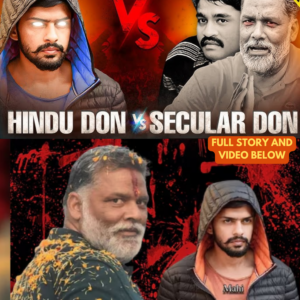Baba Siddique Murder: After the murder of Baba Siddique, threat to Salman Khan through Facebook post
In a shocking turn of events, the recent murder of Baba Siddique, a close friend of Bollywood star Salman Khan, has brought the actor into the crosshairs of the infamous Lawrence gang. A viral social media post attributed to this gang not only highlights Siddique’s death but also issues direct threats to Khan, indicating a deeper connection between the two incidents.
The post makes serious accusations against Salman Khan, claiming that he played a role in the demise of a gang member referred to as “our brother.” It alleges that Khan had previous ties with the Dawood gang and suggests that ongoing tensions involve not just personal vendettas but also larger issues surrounding Bollywood and property dealings. This assertion amplifies concerns about the dangers faced by those close to Khan.
Central to this unfolding narrative is the identity of those involved. The post mentions a figure named Shubham Lonkar, who has reportedly confessed to police about his links to the Lawrence gang and his communications with Lawrence Bishnoi, the gang’s leader. Lonkar’s admissions underscore the organized nature of the threats directed at Khan.
In addition to Shubham, the post references a person named Anuj, who was implicated in a shooting incident outside Khan’s residence earlier this year. Anuj, one of the alleged shooters, was arrested but later died in police custody, raising questions about the circumstances surrounding his death and the possible implications for ongoing investigations.
The violence linked to the Lawrence gang is not limited to threats against Khan. The gang has a history of targeting Punjabi singers associated with him. Notable incidents include shootings at the homes of singers Amritpal Singh Dhillon and Gippy Grewal, further establishing a pattern of intimidation against those who are perceived to be close to the Bollywood star.
This escalating situation has drawn attention to the ongoing rivalry between Lawrence Bishnoi and Salman Khan. For over fifteen years, Bishnoi has publicly expressed his animosity towards Khan, rooted in a 1998 hunting case where Khan was convicted for killing blackbucks, an animal sacred to the Bishnoi community. The community’s deep reverence for these creatures has fueled Bishnoi’s vendetta against the actor.
The social media post serves not only as a threat but also as a declaration of war against anyone who supports Khan. It emphasizes that those who align themselves with the actor will face severe repercussions, revealing the extent to which the Lawrence gang is willing to go to assert its power and control.
As the investigation into Baba Siddique’s murder unfolds, the implications for Salman Khan and those around him become increasingly serious. The actor’s long-standing disputes with criminal elements have now manifested in a very real and dangerous manner, leaving fans and colleagues concerned for his safety.
This situation highlights the complex interplay between celebrity culture and organized crime in India, where personal relationships can quickly become entangled in violent rivalries. The need for security and protection for public figures like Salman Khan has never been more pronounced.
In the wake of these events, the public and authorities alike are left to ponder the ongoing threat posed by gangs like Lawrence’s and the potential for further violence in an already tumultuous landscape. As the story develops, it raises critical questions about safety, accountability, and the far-reaching effects of criminal networks in the entertainment industry.
News
Amitabh Bachchan behaved badly with his daughter-in-law Aishwarya Rai | Amitabh IGNORE Aishwarya Rai
In recent weeks, a wave of speculation has emerged suggesting that all may not be well between former Miss World Aishwarya Rai and the iconic Bachchan family. This speculation has captured the attention of fans and the media, as rumors…
Amitabh gave a message to daughter-in-law Aishwarya Rai, said “No matter how your house is, it is yours”
Amitabh Bachchan, the iconic figure of Indian cinema, has a longstanding tradition of engaging with his audience through social media. He often shares reflections on his life, career, and personal philosophies. Recently, a particular post of his has stirred significant…
Salman Khan vs Lawrence Bishnoi | Why it is Happening? |
Salman Khan vs Lawrence Bishnoi | Why it is Happening? | The tension between Bollywood superstar Salman Khan and gangster Lawrence Bishnoi has become a hot topic in recent news. This clash is not just a simple feud; it embodies…
Lawrence Bishnoi Vs Pappu Yadav | Bishnoi Targets Anti-India Mafia?
In the ever-evolving landscape of India’s criminal underworld, a new chapter is unfolding, marked by the dramatic confrontation between notorious gangster Lawrence Bishnoi and the infamous Bihar don, Pappu Yadav. This rivalry has escalated recently, with Bishnoi’s gang issuing a…
LAWRENCE BISHNOI VS SALMAN KHAN, PAKISTANI PUBLIC REACTION AFTER NADEEM KHAN VIRAL VIDEO, REAL TV
The recent controversy involving Bollywood superstar Salman Khan and Lawrence Bishnoi has sparked intense discussions across communities, especially concerning allegations of animal cruelty. The speaker, representing a particular community, emphasizes that if there is evidence that Khan has harmed a…
LAWRENCE BISHNOI’S DIWALI GIFT TO PAPU YADAV LIVE, AFTER NADEEM KHAN & SALMAN KHAN, LATEST NEWS
In a recent live discussion, significant attention was drawn to the ongoing tensions surrounding Pappu Yadav and Lawrence Bishnoi, especially in light of recent developments involving prominent figures like Nadeem Khan and Salman Khan. The speaker began by addressing the…
End of content
No more pages to load











